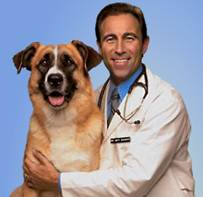Most often, canine bad breath is caused by dental or gum disease. However, persistent bad breath can also indicate larger medical problems in the mouth, respiratory system, gastrointestinal tract, or organs. Dr. Jeff Werber has answers to all of your “bad breath” questions.
Does a dog’s breath ever smell “good”?
It depends on the person. Most people, certainly myself, can’t resist the smell of “puppy breath.”
That is because, the puppies have not yet begun to teethe. When dogs begin to cut teeth, the gums bleed, and extra blood starts to congeal and clot within the mouth, giving a dog that yucky (that’s a technical term) breath.
Even if it doesn’t smell “good,” your dog’s normal breath should not be offensive. Routine oral care should eliminate superficial bacterial sources, and providing chew toys designed to remove plaque and massage gums are good supplements. To actually have your dog’s breath smell Good, you can also try a pet breath spray, a water additive, or other breath freshener.
Normally, at about three years of age, plaque and tartar begin to accumulate inside the mouth and contribute to bad breath. At about this time, a dental examination and possible teeth cleaning should be performed under your veterinarian’s direction to prevent the onset of dental disease.
A hallmark of dental disease is bad breath, and how bad the smell usually correlates to how advanced the disease is. Don’t wait until you can’t bear to have Rover near you—advanced dental and gum disease can result in damaged teeth, bone loss, infection, and can even cause heart disease, and kidney problems.
Another form of bad breath, which is equally bad, is uremic breath, which results from the accumulation of urea and ammonia byproducts in the mouth and saliva because of kidney disease. It’s a familiar ammonia-like smell, recognizable even to an untrained pet owner.
If my dog’s breath smells bad because of gum disease, is that something to be very concerned about?
75 % dogs and cats over the age of 3 already have some degree of periodontal disease. It should concern you enough to take your dog to your veterinarian for a professional evaluation and cleaning. And enough to commit to a regular home oral care protocol of regular brushing, and considering the use of other oral support products.
What are some ways we can prevent gum disease in dogs?
Brush your dog’s teeth daily, but at a minimum 3 days a week, and use some kind of oral hygiene gel, mouth rinse, water additives, and/or gum stimulating dental chew toys, such as Dingo, Smart bone, or Greenies to help support oral health. And be sure to see your veterinarian for check ups at least twice a year.
What are some bad breath warning signs? (i.e., what type of smell should we be looking out for?)
• If the smell is ammonia-like, then it could indicate a serious kidney problem or even kidney failure.
• A strong repulsive, putrid smell suggests progressive gum disease.
• What should I do if I notice a change in my dog’s breath?
See your veterinarian immediately, especially if the smell is ammonia-like or extremely pungent.
Is there anything else you’d like to add?
I want to caution readers against going to groomers to solve oral disease issues. In fact in many states, it is illegal for groomers to clean pets’ teeth. Veterinary dentists and the American College of Veterinary Dentistry highly recommend some form of sedation or anesthesia during a cleaning, in order to get below the gum surface to effectively clean dogs’ teeth. Generally, the degree of disease evident on the outside is matched by the disease under the gums. If left untreated this can result in bone disruption and severe and continued dental diseases. Don’t compromise your dog’s health.
 About Dr. Jeff Werber
About Dr. Jeff Werber
Dr. Jeff Werber has dedicated his life to the care and protection of animals. A renowned veterinarian and pet parenting specialist, Dr. Jeff maintains that pets are more than just companions; they are part of the family and deserve to be treated that way.
A top graduate of the University of California Davis Veterinary School, Dr. Jeff established his Los Angeles-based private clinic, Century Veterinary Group, in 1988. Dr. Jeff cares for the pets of Hollywood’s biggest stars, including Britney Spears, Julia Roberts, Ben Affleck, Eddie Murphy, Paula Abdul, Rod Stewart, Mark Wahlberg, Patrick Dempsey, Mandy Moore, Jennifer Love Hewittand many more – along with those of everyday pet owners.
He is a highly sought after and frequent guest speaker on a number of national news programs and has lent his expertise on CBS’ The Early Show and Sunday Morning, CNN Sunday Morning, Fox News Channel and Rachael Ray. As an Emmy Award winning veterinarian, he has hosted the wildly popular Petcetera on Animal Planet Network, sharing his compassion and knowledge with millions of viewers around the country, encouraging responsible pet ownership and care.
Dr. Jeff is dedicates his time to many groups in the animal welfare community, such as Best Friends Animal Society, Last Chance for Animals, Hounds and Heroes and a number of rescue groups including Angel City Pits, Ace of Hearts, Forever Fido, Wags and Walks, Furry Friends, Eloise, Bill Foundation, among others. He also serves on the advisory board of Veterinary Economics Magazine.
Dr. Jeff has translated a childhood love of pets into a career committed to raising and shaping national awareness of the importance of high quality pet care. To learn more about Dr. Jeff, visit www.drjeff.com.
 Dog Living A lifestyle magazine for dog lovers
Dog Living A lifestyle magazine for dog lovers





